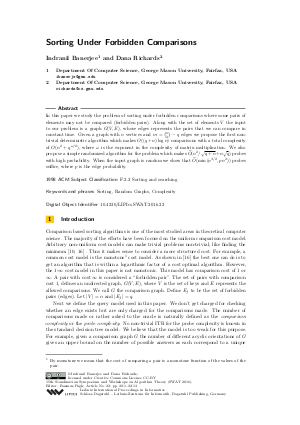Sorting Under Forbidden Comparisons
Authors Indranil Banerjee, Dana Richards
-
Part of:
Volume:
15th Scandinavian Symposium and Workshops on Algorithm Theory (SWAT 2016)
Part of: Series: Leibniz International Proceedings in Informatics (LIPIcs)
Part of: Conference: Scandinavian Symposium and Workshops on Algorithm Theory (SWAT) - License:
 Creative Commons Attribution 3.0 Unported license
Creative Commons Attribution 3.0 Unported license
- Publication Date: 2016-06-22
File

PDF
LIPIcs.SWAT.2016.22.pdf
- Filesize: 0.55 MB
- 13 pages
Document Identifiers
Subject Classification
Keywords
- Sorting
- Random Graphs
- Complexity
Metrics
- Access Statistics
-
Total Accesses (updated on a weekly basis)
0PDF Downloads0Metadata Views
Abstract
In this paper we study the problem of sorting under forbidden comparisons where some pairs of elements may not be compared (forbidden pairs). Along with the set of elements V the input to our problem is a graph G(V, E), whose edges represents the pairs that we can compare in constant time. Given a graph with n vertices and m = binom(n)(2) - q edges we propose the first non-trivial deterministic algorithm which makes O((q + n)*log(n)) comparisons with a total complexity of O(n^2 + q^(omega/2)), where omega is the exponent in the complexity of matrix multiplication. We also propose a simple randomized algorithm for the problem which makes widetilde O(n^2/sqrt(q+n) + nsqrt(q)) probes with high probability. When the input graph is random we show that widetilde O(min(n^(3/2), pn^2)) probes suffice, where p is the edge probability.
Cite As Get BibTex
Indranil Banerjee and Dana Richards. Sorting Under Forbidden Comparisons. In 15th Scandinavian Symposium and Workshops on Algorithm Theory (SWAT 2016). Leibniz International Proceedings in Informatics (LIPIcs), Volume 53, pp. 22:1-22:13, Schloss Dagstuhl – Leibniz-Zentrum für Informatik (2016)
https://doi.org/10.4230/LIPIcs.SWAT.2016.22
BibTex
@InProceedings{banerjee_et_al:LIPIcs.SWAT.2016.22,
author = {Banerjee, Indranil and Richards, Dana},
title = {{Sorting Under Forbidden Comparisons}},
booktitle = {15th Scandinavian Symposium and Workshops on Algorithm Theory (SWAT 2016)},
pages = {22:1--22:13},
series = {Leibniz International Proceedings in Informatics (LIPIcs)},
ISBN = {978-3-95977-011-8},
ISSN = {1868-8969},
year = {2016},
volume = {53},
editor = {Pagh, Rasmus},
publisher = {Schloss Dagstuhl -- Leibniz-Zentrum f{\"u}r Informatik},
address = {Dagstuhl, Germany},
URL = {https://drops.dagstuhl.de/entities/document/10.4230/LIPIcs.SWAT.2016.22},
URN = {urn:nbn:de:0030-drops-60448},
doi = {10.4230/LIPIcs.SWAT.2016.22},
annote = {Keywords: Sorting, Random Graphs, Complexity}
}
Author Details
References
-
Miklós Ajtai, János Komlós, William Steiger, and Endre Szemerédi. Almost sorting in one round. Randomness and Computation, 5:117-125, 1989.

- Mohamad Akra and Louay Bazzi. On the solution of linear recurrence equations. Comp. Opt. and Appl., 10(2):195-210, 1998. URL: http://dx.doi.org/10.1023/A:1018373005182,
- Noga Alon, Manuel Blum, Amos Fiat, Sampath Kannan, Moni Naor, and Rafail Ostrovsky. Matching nuts and bolts. In Proceedings of the Fifth Annual ACM-SIAM Symposium on Discrete Algorithms. 23-25 January 1994, Arlington, Virginia., pages 690-696, 1994. URL: http://dl.acm.org/citation.cfm?id=314464.314673.
- Stanislav Angelov, Keshav Kunal, and Andrew McGregor. Sorting and selection with random costs. In LATIN 2008: Theoretical Informatics, 8th Latin American Symposium, Búzios, Brazil, April 7-11, 2008, Proceedings, pages 48-59, 2008. URL: http://dx.doi.org/10.1007/978-3-540-78773-0_5,
-
Béla Bollobás and Graham Brightwell. Graphs whose every transitive orientation contains almost every relation. Israel Journal of Mathematics, 59(1):112-128, 1987.

- Béla Bollobás and Graham R. Brightwell. Transitive orientations of graphs. SIAM J. Comput., 17(6):1119-1133, 1988. URL: http://dx.doi.org/10.1137/0217072,
-
Béla Bollobás and Moshe Rosenfeld. Sorting in one round. Israel Journal of Mathematics, 38(1-2):154-160, 1981.

- Jean Cardinal and Samuel Fiorini. On generalized comparison-based sorting problems. In Space-Efficient Data Structures, Streams, and Algorithms - Papers in Honor of J. Ian Munro on the Occasion of His 66th Birthday, pages 164-175, 2013. URL: http://dx.doi.org/10.1007/978-3-642-40273-9_12,
- Jean Cardinal, Samuel Fiorini, Gwenaël Joret, Raphaël M. Jungers, and J. Ian Munro. An efficient algorithm for partial order production. SIAM J. Comput., 39(7):2927-2940, 2010. URL: http://dx.doi.org/10.1137/090759860,
- Moses Charikar, Ronald Fagin, Venkatesan Guruswami, Jon M. Kleinberg, Prabhakar Raghavan, and Amit Sahai. Query strategies for priced information. J. Comput. Syst. Sci., 64(4):785-819, 2002. URL: http://dx.doi.org/10.1006/jcss.2002.1828,
-
SD Chatterji. The number of topologies on n points, kent state university. NASA Technical Report, 1966.

- Constantinos Daskalakis, Richard M. Karp, Elchanan Mossel, Samantha Riesenfeld, and Elad Verbin. Sorting and selection in posets. SIAM J. Comput., 40(3):597-622, 2011. URL: http://dx.doi.org/10.1137/070697720,
- Martin E. Dyer, Alan M. Frieze, and Ravi Kannan. A random polynomial time algorithm for approximating the volume of convex bodies. J. ACM, 38(1):1-17, 1991. URL: http://doi.acm.org/10.1145/102782.102783, URL: http://dx.doi.org/10.1145/102782.102783.
- Ulrich Faigle and György Turán. Sorting and recognition problems for ordered sets. SIAM J. Comput., 17(1):100-113, 1988. URL: http://dx.doi.org/10.1137/0217007,
- Wayne Goddard, Claire Kenyon, Valerie King, and Leonard J. Schulman. Optimal randomized algorithms for local sorting and set-maxima. SIAM J. Comput., 22(2):272-283, 1993. URL: http://dx.doi.org/10.1137/0222020,
- Anupam Gupta and Amit Kumar. Sorting and selection with structured costs. In 42nd Annual Symposium on Foundations of Computer Science, FOCS 2001, 14-17 October 2001, Las Vegas, Nevada, USA, pages 416-425, 2001. URL: http://dx.doi.org/10.1109/SFCS.2001.959916,
- Zhiyi Huang, Sampath Kannan, and Sanjeev Khanna. Algorithms for the generalized sorting problem. In IEEE 52nd Annual Symposium on Foundations of Computer Science, FOCS 2011, Palm Springs, CA, USA, October 22-25, 2011, pages 738-747, 2011. URL: http://dx.doi.org/10.1109/FOCS.2011.54,
- Nabil Kahale and Leonard J. Schulman. Bounds on the chromatic polynomial and on the number of acyclic orientations of a graph. Combinatorica, 16(3):383-397, 1996. URL: http://dx.doi.org/10.1007/BF01261322,
-
Jeff Kahn and Michael Saks. Balancing poset extensions. Order, 1(2):113-126, 1984.

- János Komlós, Yuan Ma, and Endre Szemerédi. Matching nuts and bolts in o(n log n) time. SIAM J. Discrete Math., 11(3):347-372, 1998. URL: http://dx.doi.org/10.1137/S0895480196304982,
-
John E. Savage. Models of computation - exploring the power of computing. Addison-Wesley, 1998.

